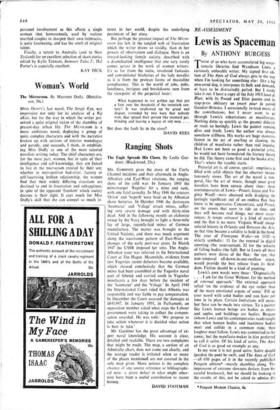Ranging Shots
The Eagle Spreads His Claws. By Leslie Gar- diner. (Blackwood, 25s.)
MR. GARDINER gives the story of the Corfu Channel incidents and their aftermath in Anglo- Albanian and East-West relations, the ranging shots of the cold war. In January 1945 the minesweeper `Regulus' hit a mine and sank, with one fatal casualty. In May 1946 the cruisers `Orion' and `Superb' were fired on by Albanian shore batteries. In October 1946 the destroyers `Saumarez' and `Volage' struck mines, suffer- ing very severe damage and with thirty-nine dead. And in the following month an elaborate sweep by the Navy,brought to light a three-mile lay of large, recently-laid mines of German manufacture. The matter was brought to the United Nations, and there was much argument along the wearisome pattern of East-West ex- changes of the early post-war years. In March 1947 the USSR imposed her veto. The Anglo- Albanian issue was referred to the International Court at The Hague. Meanwhile, evidence from two Yugoslav recent defectors became available, which showed conclusively that the German mines had been assembled at the Yugoslav naval port of Sibenik and carried south in Yugoslav minelayers a few days before the incident of the `Saumarez' and the `Volage.' In April 1949 the International Court ruled that Albania was responsible and was liable to pay compensation. In December the Court assessed the damages at £843,947. In January 1951, in Parliament, an opposition member asked what steps the Labour government were taking to collect the compen- sation awarded. He was told: `We propose to take action whenever it is decided what action is best to take.'
Mr. Gardiner has the great advantage of ex- pert naval knowledge. His account is clear, detailed and readable. There are two complaints that might be made. The map, a section of an Admiralty chart, does not come out clearly, and the average reader is irritated when so many of the places mentioned are not covered in the only map given. More serious is the complete absence of any source reference or bibliographi- cal note—a grave defect in what might other- wise have been a useful contribution to recent history.
DAVID FOOTMAN


































 Previous page
Previous page